The week ahead in Parliament
- Published
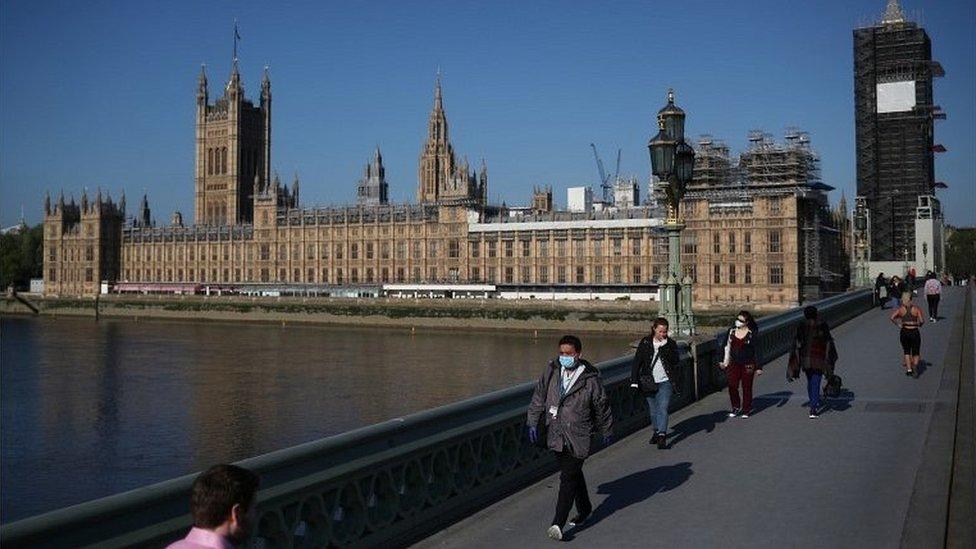
It's the last week of term, but it ends not with a grateful whimper, but with a bang. MPs move ahead with some heavy duty legislating with the initial debates on two controversial new laws, enlivened by a more packed Commons.
This week the Speaker will relax some of the covid precautions that have so drained the life from the Commons Chamber, removing some of the social distancing measures like barriers closing off some green benches.
MPs will still be able to take part in debates virtually, and the wearing of masks will still be "encouraged" in the Chamber, although it will no longer be mandatory. Unions have been told by the Speaker that he has no way to make MPs mask up.
Crucially, the Call List system will continue, so MPs will know in advance if they will have a chance to speak, and in what order. This has been a huge advantage for ministers, almost eliminating the possibility of a surprise attack erupting from an unexpected angle.
The proxy voting system, which sees the party whips deploying, sometimes hundreds of votes, will remain. But, assuming there are no changes to the Government Roadmap, fully physical proceedings will resume in the Chamber from September.
Elsewhere, look out for an end of term spate of committee reports - Public Accounts verdict on COVID procurement issues, Treasury on the Greensill affair, Digital, Culture, Media and Sport on concussion in sport, and Housing, Communities and Local Government on local authority finances. As I write, it's not clear if the blockbuster report from the joint Health and Science committees on the lessons of the pandemic will emerge before the summer; it is doubtless a mammoth task to digest the vast tonnage of evidence they have received, not least from the Prime Minister's former advisor, Dominic Cummings. The number of private meetings they've been having suggests they are chewing their way through it.
Here's my rundown of the last week of term.
Monday 19th July
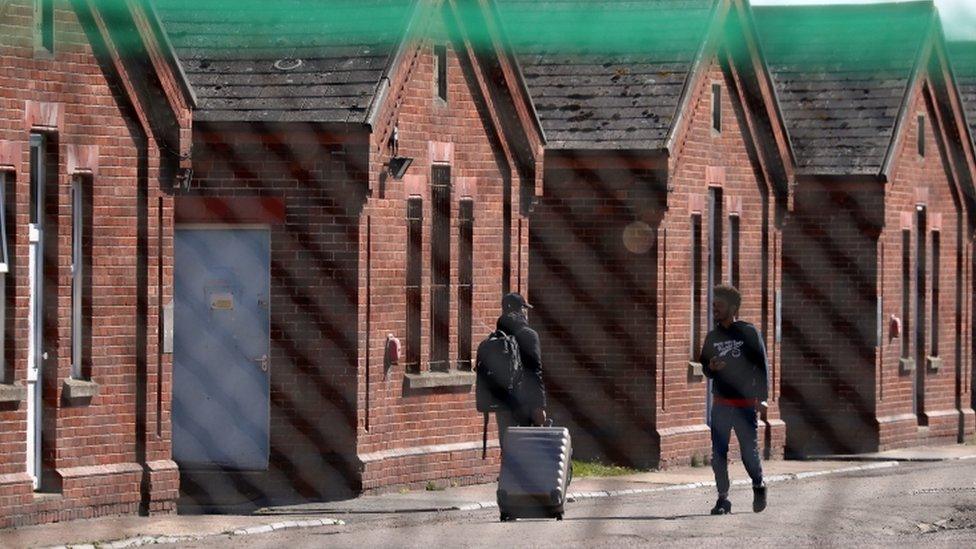
The Napier Barracks in Kent have been controversially turned into accommodation for asylum seekers
The Commons opens (14:30) with an hour of Housing, Communities and Local Government questions - probably followed by the usual post weekend helping of government statements and urgent questions.
The main event is day one of a two day second reading debate on one of the major measures in the government's programme, the Nationality and Borders Bill. The central part of this bill is an overhaul of the system for asylum seekers (36,700 people claimed asylum in the UK in 2019), creating a new Temporary Protection Status for people who enter the UK illegally. This will restrict family reunion rights and holders would have no recourse to public funds unless destitute.
The Bill would allow asylum seekers to be removed to a safe third country, before their application for asylum is considered, to remove incentives for economic migrants to claim asylum. It also seeks to speed up the existing appeals system. The threshold for deportation for committing a criminal offence would be lowered - at the moment deportation follows a two year prison sentence, that is being lowered to one year.
Labour will be opposing the Bill outright, but the expectation is that the Second Reading will be followed by four days of evidence hearings in Public Bill Committee in September. Then, twelve sessions of line by line scrutiny in October, and back to the Commons for Report Stage after that. All this implies that the Bill should come before the Lords in late November, with their crucial Report Stage consideration in, perhaps, January. Report stage in the Lords is the part of the process where the government is least in control, so expect some attempts to rewrite the Bill then.
In Westminster Hall there are two debates on petitions to parliament, starting (16:15) with e-petition 317336, external on cervical screening. This calls on the government to bring in Fiona's law, named after Fiona Mathewson from the Scottish Borders who died of a cervical cancer which was detected during a routine smear test. The petition, which has more than 146,000 signatures, says annual screening is needed because women are dying.
Next (18:15) is e-petition 567681, external, calling for an amnesty for undocumented migrants. It has attracted more than 103,000 signatures, arguing that "undocumented migrants are suffering in silence, with no access to adequate financial support, or any help."
On the Committee Corridor, Public Accounts (14:30) returns to the evergreen subject of Crossrail - the railway mega-project tunnelling under central London. Witnesses include Mark Wild, CEO at Crossrail Ltd, and Bernadette Kelly, the Permanent Secretary at the Department for Transport.
European Scrutiny (14:45) questions the government's Brexit supremo, Lord Frost on the Northern Ireland Protocol and the Brexit divorce bill in a short 45-minute session. There are rumours that there could be movement on the issue this week.
In the Lords (13:00) the former Home Secretary, Lord Blunkett, questions ministers about the regulations for British citizens who visit countries with low COVID infection rates.
Then peers move on to their third day of detailed committee stage consideration of the Skills and Post-16 Education Bill. The main issues include putting the lifetime skills guarantee on a statutory footing. Remember, this is the "probing" stage of the process, amendments are not normally pushed to a vote.
Tuesday 20th July
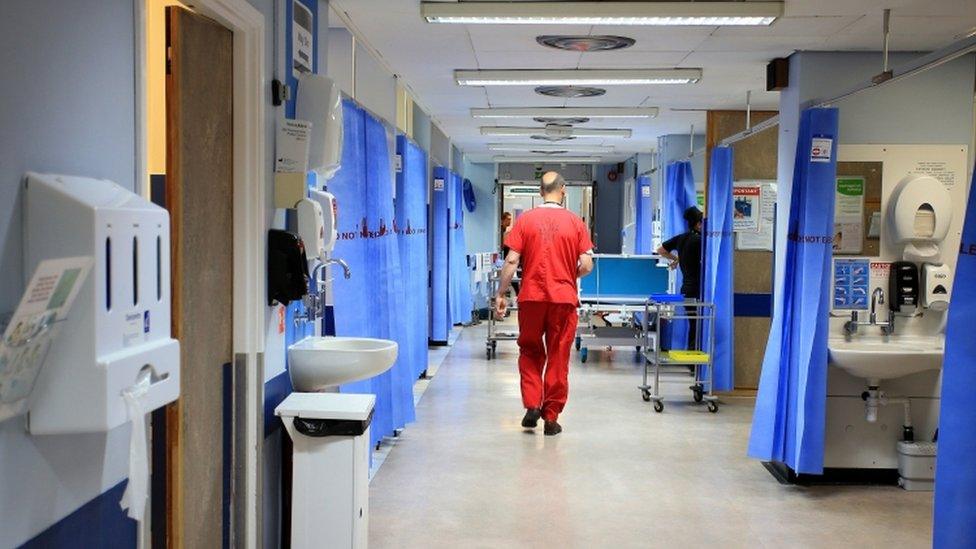
The Health and Social Care Committee will consider the government's planned data sharing scheme for NHS patients
The Commons opens (11:30) with a hour of Foreign Office questions. The main business will be the final day of the Second Reading debate on the Nationality and Borders Bill.
In Westminster Hall, the Conservative Cherilyn Mackrory leads a debate (09:25) on progress towards the national ambition to reduce baby loss.
Committee action includes Education (10:00) looking at Children's Homes, with the former Children's Commissioner, Anne Longfield. Josh MacAlister of the Independent Review of Children's Social Care will also attend, as well as the Labour Peer, Lord Adonis, who spent several years in a children's home.
Health and Social Care Committee will question the Health Minister Lord Bethell on the plans for the government's new patient data-sharing scheme, which enables NHS Digital to share data from GP medical records.
In the Lords (13:00) the human rights campaigner Lord Alton has a question on curtailing reliance on Chinese products and companies linked to violations of human rights. He's been pushing amendments to the Telecommunications Bill on a similar theme.
Then, in what promises to be a lively debate, peers consider a Conduct Committee report recommending that three peers, Lord James of Blackheath, Lord Kalms and Lord Willoughby de Broke should have their access to House of Lords services restricted. This would be to limit their contact with staff following their refusal to take part in Valuing Everyone training.
The training was brought in after a report revealed problems with bullying and sexual harassment. A fourth peer, Baroness Mone, was found to have breached the Code of Conduct by failing to undertake the training by the 1st April deadline, but has now completed it, so no sanctions are proposed in her case.
Then peers come to what looks like the major event of their week, report stage consideration of the Leasehold Reform (Ground Rent) Bill, where there's an amendment from the Labour Peer Lord Lennie to ensure the Government introduces further legislation to remove ground rent for all leaseholders, because the bill currently only applies to newly established leases.
Lord Lennie argues that ground rent is "an almost feudal practice," and that action is needed to help households already "trapped" into paying them. This applies to about five million properties in England, around one in five homes, many of which have seen their ground rents increased at unmanageable rates.
They will also be asked to approve the Health and Social Care Act 2008 (Regulated Activities) (Amendment) (Coronavirus) Regulations - which require staff in care homes to be vaccinated. This provoked a Tory rebellion in the Commons with 31 MPs voting against the government, but the Lords almost never votes down this kind of regulation.
Wednesday 21st July
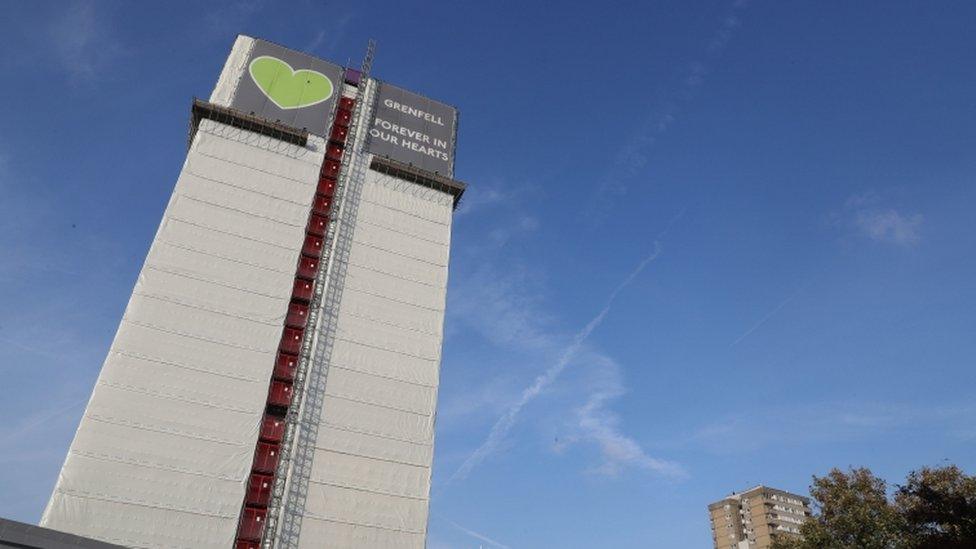
The Building Safety Bill will implement changes for fire safety in buildings
MPs begin (11:30) with half an hour of Northern Ireland questions, followed at midday by questions to the Prime Minister.
The main event is the Second Reading of the Building Safety Bill. this is designed to implement the outcome of Dame Judith Hackitt's post-Grenfell review of fire safety, and the subsequent government consultation exercise.
The Bill creates a new National Building Safety Regulator, provides tougher penalties for safety offences and gives a stronger voice to residents about safety concerns. It will clarify who is responsible for safety issues, throughout the design, construction and occupation of high-rise buildings, and require that developers must belong to a New Homes Ombudsman scheme.
It's all uncontroversial, but expect further attempts by the Opposition and some Conservatives to add a requirement that leaseholders should not have to pay for the fire safety work required under the bill. This will be a repeat of the battles over the post-Grenfell disaster Fire Safety Act, which saw peers attempt three times to press an amendment on that issue. So expect considerable to-ing and fro-ing between the Commons and the Lords at some point late this year, or early in 2022.
In Westminster Hall (09:25) Labour's Dame Angela Eagle leads a debate on the privatisation of Channel Four. The Conservative Chair of the Environment, Food and Rural Affairs Committee, Neil Parish leads a debate (14:30) on the role of the Trade and Agriculture Commission in international trade deals - this is the body set up to monitor the food standards requirements on food imported under new trade agreements - a sensitive issue for agriculture.
With concerns about the level of government borrowing and inflation, the Treasury Committee has an important-looking hearing with members of the Office for Budget Responsibility about their Fiscal Risks Report (14:30).
In the Lords (12:00) the Crossbencher Baroness Boycott has a question on creating a crime of Ecocide, and Labour's Lord Soley resumes his campaign for a register of home educated children.
Then peers resume committee stage consideration of the Skills and Post-16 Education Bill.
Thursday 22nd July
It's the last day of term, and MPs begin with 40 minutes of Environment, Food and Rural Affairs questions. Then the MPs who speak for the Church Commissioners, the House of Commons Commission and others take questions from MPs. The Leader of the House will lay out the proposed parliamentary agenda when MPs return on 7th September.
The main events are a debate on a motion on Public Administration and Constitutional Affairs Committee (PACAC) report on a public inquiry into the government's response to the pandemic. Senior figures in the Commons have been keen to get some promises on the record about the process and remit for the inquiry (whether it should be narrowly-focussed or wide-ranging) and about parliament's role. In particular, whether a select committee will have a chance to vet whoever is designated to chair it. PACAC Chair, William Wragg, leads the debate, with a Cabinet Office minister responding.
Finally, there's the traditional debate held before any recess, in which MPs can speak on any subject they choose. A hapless minister has to field a huge range of subjects, and usually ends up promising that a ministerial colleague will write to a particular MP about a particular issue. Attempts to give some shape to this exercise have been abandoned, and the result is an oddly amorphous occasion. It will launch a thousand constituency press releases as MPs get a rare chance to speak about their local bypass or A&E.
Slightly surprisingly, there's a some last-day committee action: Public Accounts (10:00) continues its hearings on the Greensill Capital affair, with a posse of top civil servants, headed by the Treasury Permanent Secretary, Sir Tom Scholar and his deputy Charles Roxburgh.
In the Lords (14:30), peers sign off with questions on making it easier for young people to get on the electoral register, and creating higher bands for council tax.
Then there are debates on two select committee reports. First, the Public Services Committee report, 'A critical juncture for public services: lessons from COVID-19' and then the European Union Committee report, 'The future UK-EU relationship on professional and business services'.
Then, peers will be asked to approve the Calorie Labelling (Out of Home Sector) (England) Regulations 2021 - where Labour have put down a regret motion.
And with that, parliament rises for its summer break - returning on September 7th, barring any urgent recall, of course.
Related topics
- Published1 July 2021
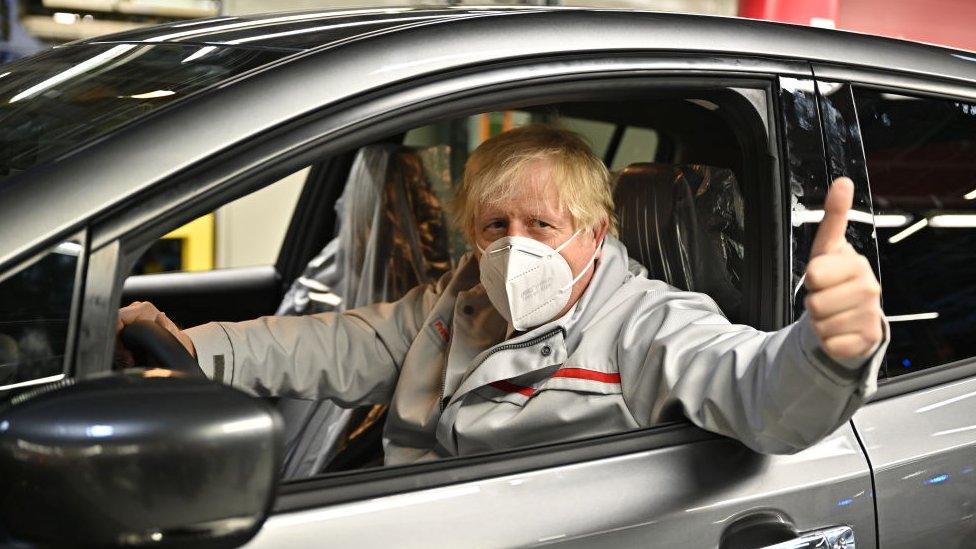
- Published2 July 2021
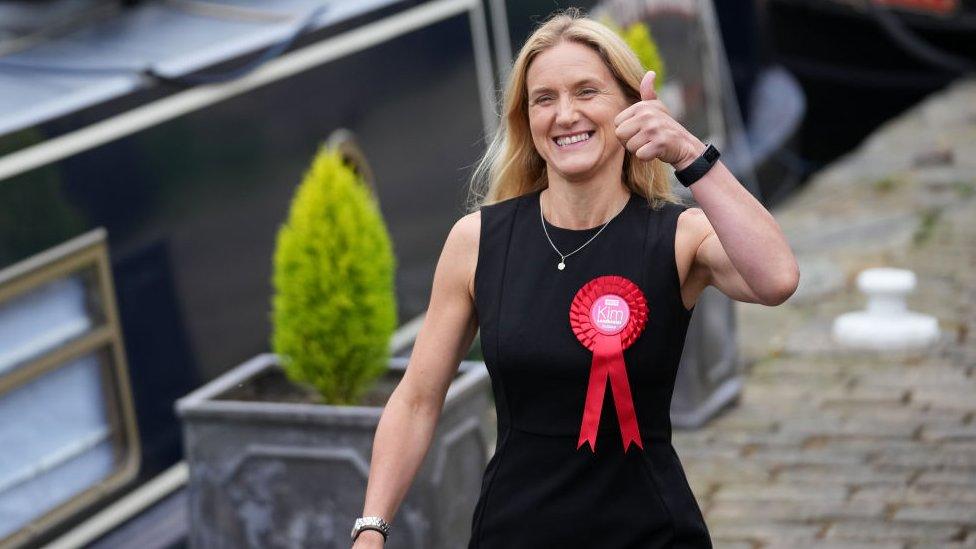
- Published5 August 2021

